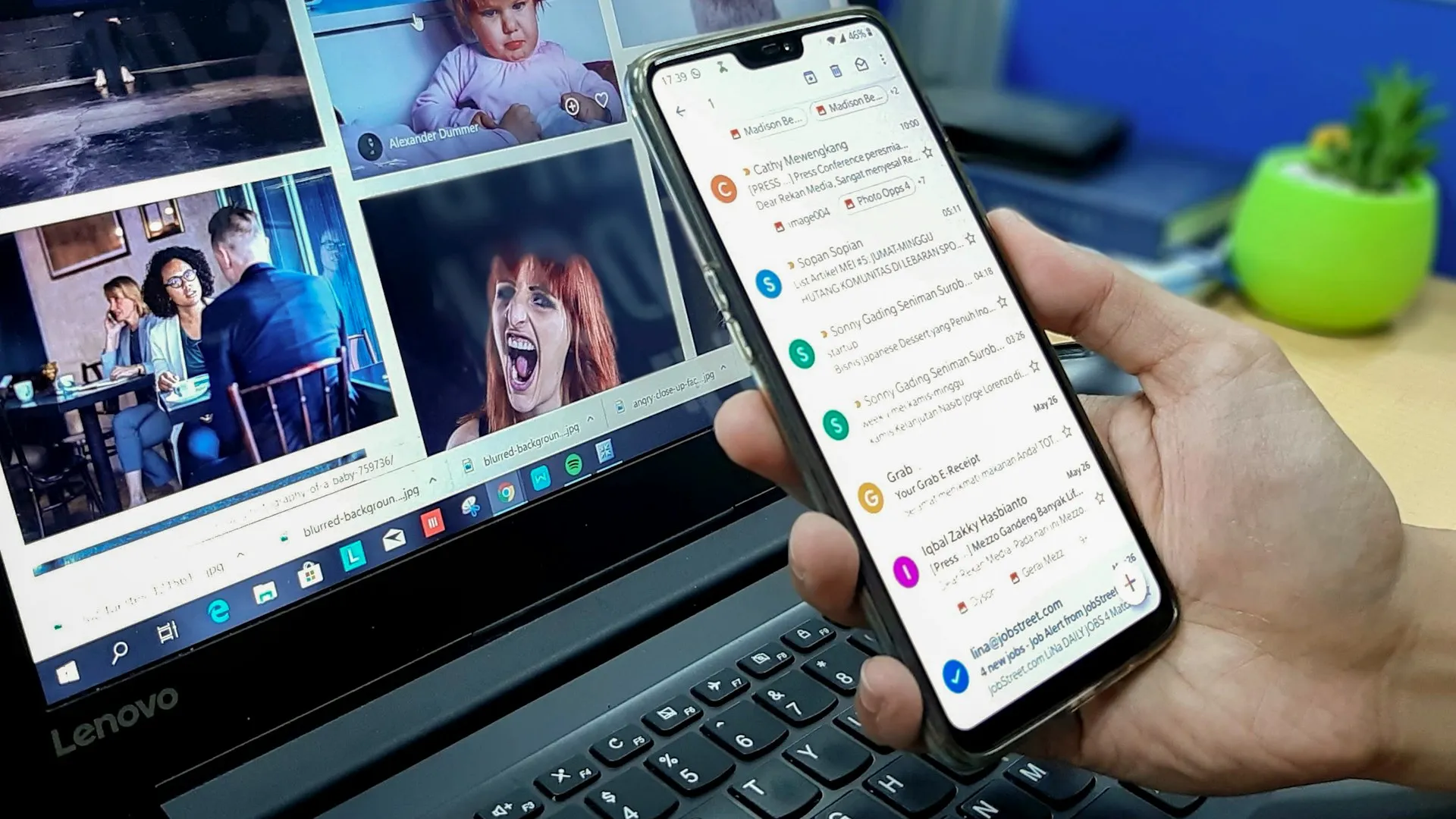Phishing emails are a persistent threat to your online security. These deceptive messages masquerade as communication from reputable companies, enticing you to reveal sensitive information. To outsmart these digital traps, it’s crucial to scrutinize each email’s authenticity and practice caution with any request for personal data, especially if it’s unexpected. Remember, legitimate organizations will rarely ask for your private details via email without prior verification purposes.
When you encounter suspicious emails, pausing and evaluating them can be your strongest defense. Look for signs of phishing, such as unfamiliar senders or pressure to act quickly. By understanding what to look for and implementing these tips, you significantly reduce the risk of falling prey to these nefarious schemes.

Understanding the Phishing Threat Landscape
Phishing is a form of Internet piracy that can wreak havoc on your financial and personal reputation. Recognizing emails that may appear to come from a reputable company is a key step in protecting yourself. These fraudulent attempts to steal your personal information are often well-crafted, but knowledge of how phishing works and vigilant protection practices can help you avoid becoming a victim of this crime.
Recognizing Different Types of Phishing Scams
Phishing involves varied techniques designed to deceive. From attachments and links in emails to urgent requests via direct messages or phone calls, scammers are constantly refining their approaches. Voice phishing, also known as vishing, and angler phishing on public Wi-Fi networks are emerging threats. Be wary of phishing messages with an urgent request to take action; such attempts to steal your information are often disguised as legitimate but can lead to dire consequences.
Who is Vulnerable to Phishing Intrusions?
No one is immune to the risks of phishing. Whether you’re a senior citizen, a young adult, or a small business owner, cyber criminals do not discriminate. They often target those less familiar with the signs of phishing, such as unexpected emails or requests for sensitive information. However, even tech-savvy individuals can be caught off guard without vigilance.
Understanding that your online behavior can make you more susceptible is crucial. You might be at a higher risk if you frequently share personal details on social media or click on links without scrutiny. Remember, staying informed and cautious is your best defense against these malicious attempts to compromise your personal and financial information.
The Anatomy of a Phishing Email
Phishing emails are crafted to deceive. They mimic legitimate communications from trusted entities, often urging immediate action. The goal is to trick you into providing personal data or clicking on a malicious link. Recognizing the anatomy of such emails, from the sender’s address to the tone of the message, is key to identifying and avoiding these scams.
Dissecting Phishing Email Characteristics
Identifying a phishing email often involves looking for inconsistencies. Check for generic greetings, misspelled words, and urgent calls to action that seem out of character for the supposed sender. Moreover, look for mismatched URLs where the hyperlink text does not match the destination, a common red flag of phishing attempts.
Subject Lines That Should Raise Red Flags
Be wary of subject lines that create a sense of urgency or offer too-good-to-be-true promotions. Phrases like “Immediate action required” or “You’ve won a prize!” are tactics to prompt a quick, emotional response. If the subject line makes you feel pressured to act swiftly, take a moment to consider its legitimacy before opening the email.
Analyzing Sender Information for Authenticity
Scrutinizing the sender’s information is critical in verifying an email’s authenticity. Check the sender’s email address carefully; it may be a clever imitation of a legitimate one, with subtle differences like misspellings or additional characters. Authentic organizations rarely use public email services for official communication, so be suspicious of such details.
HTTPS and Email Security – What You Need to Know
Secure Hypertext Transfer Protocol (HTTPS) is a fundamental security feature you should look for in websites, especially when entering personal info. This encryption ensures that data between your browser and the site is private, making it harder for phishers to intercept. Checking for HTTPS in the address bar is crucial before submitting sensitive information during online transactions, such as confirmation emails or text messages regarding online orders. E-commerce security further emphasizes the importance of HTTPS, as it protects not only customer data but also the integrity of online transactions, fostering trust between businesses and their customers.
Beyond looking for HTTPS, be wary of emails asking for personal details. Phishers often mimic legitimate businesses, sending genuine emails or text messages. Always verify the source before clicking any links or downloading attachments. If unsure, contact the company using information from their official website, not the contact details provided in the suspicious email or text message.

Proactive Measures Against Phishing Attempts
Phishing attacks are constantly evolving, targeting your security vulnerabilities. To stay ahead, adopt a proactive defense by integrating real-time protection solutions. For instance, subscribing to all-in-one digital security services can shield you from the latest phishing schemes, safeguard your personal data, and alert you to potential threats. Embrace a proactive mindset to reduce the risk of falling prey to sophisticated phishing tactics.
Email Security Practices for Individuals and Small Businesses
Most phishing attacks happen via email, exploiting individuals and small businesses. To defend against these scams, implement robust email security practices. Use strong, unique passwords for each account, enable two-factor authentication, and train yourself and your employees to spot suspicious emails. Regularly updating software and educating your team on the latest phishing trends are also key strategies to fortify your defenses against these ever-present online threats. Additionally, utilize a password-strength assessment tool to verify that your passwords are robust and difficult to crack, adding an extra layer of security against cyber threats.
The Role of Antivirus Software in Email Protection
Antivirus software plays a vital role in email protection, scanning incoming messages for phishing attacks and preventing the downloading of malware. It’s essential to keep your antivirus updated to recognize the latest threats. Additionally, many antivirus programs offer email scanning features that detect and isolate phishing attempts, adding an extra layer of security to your digital correspondence and ensuring your inbox remains a safe space for communication.
Best Practices for Password Management and Security
In the wake of a data breach, strong passwords can be the last line of defense. To enhance your security, adopt password managers that generate and store robust passwords. These tools create complex passwords difficult for cybercriminals to crack, reducing the risk of unauthorized access to your accounts. Regularly changing passwords and avoiding reuse across multiple sites are best practices that significantly bolster your online protection.
The Importance of Regular Software and Security Updates
Keeping your software and security systems up to date is a critical defense against phishing attempts. Updates often include patches for vulnerabilities that cybercriminals exploit to gain access to systems. By ensuring that your security software is current, you’re maintaining robust layers of protection against ever-evolving threats. This includes updating antivirus programs to detect and quarantine phishing attempts and junk emails before they reach your inbox.
It’s not just security software that needs attention; your operating system and other applications should be updated regularly, too. These updates can fix security holes and improve overall system stability, making it harder for phishers to find a way in. Automating updates or setting reminders can help you stay on top of this essential task, minimizing the risk of falling prey to sophisticated phishing schemes.
Strategies for Identifying and Handling Phishing Emails
Phishing emails often land in your inbox, masquerading as legitimate correspondence, so it’s crucial to employ strategies to identify them. Always scrutinize emails that request personal information or immediate action, especially if they create a sense of urgency. Check for inconsistencies in email addresses, links, and language used. If the email seems suspicious, it’s better to contact the purported sender directly through official channels to confirm its authenticity.
Regularly reviewing your spam folder can also be instructive; it helps you recognize patterns and commonalities in phishing emails that have been automatically filtered out. Be cautious, though, as some legitimate emails might accidentally end up there. If you’re unsure whether an email is a phishing attempt, it’s safest not to click on any links and to delete the email immediately. Forwarding the email to the IT department or reporting it to the appropriate channels can also help safeguard others.
Critical Tips for Verifying Email Legitimacy Before Clicking
Before you click anything in an email, pause to verify its legitimacy. Examine the sender’s email address carefully; phishing emails may mimic legitimate ones with slight alterations that are easy to overlook. Hover over any links to preview the URL and look for misspellings or strange domains. Utilize antivirus software that includes email scanning to provide an additional layer of security. Protecting your family from phishing emails also means educating them about these risks and ensuring everyone is vigilant about the emails they open and the links they click.
The Significance of the Address Bar in Email Verification
When verifying emails, the address bar plays a crucial role. Before taking action, check the address bar for the sender’s domain to ensure it matches the organization’s legitimate website. Fraudulent emails may contain valid links but redirect you to a malicious site. Always look for HTTPS in the address bar to indicate a secure connection. Never input personal info into a webpage unless you’ve confirmed it’s secure and legitimate, and even then, proceed with caution.
Deciphering the Tell-tale Signs of Phishing Links
Phishing links often betray themselves with subtle signs. Look for misspellings, unfamiliar domain names, or URLs that don’t match the context of the email. Be wary of shortened links, which can conceal the true destination. Always hover your cursor over a link to preview the URL before clicking. If the link in the email doesn’t match what you see when you hover over it, it’s a red flag that you could be dealing with a phishing attempt.

Beyond the Inbox: Phishing in the Digital Ecosystem
Phishing extends beyond your email to the broader digital ecosystem. Cybercriminals use social media, text messages, and even phone calls to trick individuals into revealing sensitive personal information. Staying vigilant across all digital platforms is essential, as phishing attacks can come in the guise of urgent messages or enticing offers. Understanding the tactics used by phishers helps you better protect your personal and financial information across all your online activities.
Phishing Attempts via Social Media and Text Messages
Phishing attacks have infiltrated social media and text messages, becoming a pervasive threat. Scammers might impersonate reputable organizations or individuals, asking for your username and password or luring you into clicking on malicious links. Always verify the authenticity of any message that requests personal details or suggests urgent action. Be cautious with unsolicited offers or alerts that seem too good to be true. If necessary, remember to report suspicious messages to the platform’s support team or law enforcement.
Recurring Scams on Popular Social Networks
Popular social networks are fertile ground for recurring scams. Be on the lookout for messages that claim your account is at risk or offer exclusive rewards or assistance. These scams thrive on the trust built within social networks and the casual nature of communication. Familiarize yourself with the common scams reported on these platforms to better recognize and avoid them.
SMS Phishing: A Growing Concern
SMS phishing, or smishing, is a growing concern as scammers exploit the personal nature of text messages to distribute phishing links. These messages might prompt you to update your account details or claim you won a prize. Always cross-check any information received through SMS with official sources and never provide personal details or click on links from unknown or suspicious text messages.
The Intersection of Phishing and Emerging Technologies
Emerging technologies like cryptocurrency and NFTs have become new vectors for phishing schemes. Scammers exploit these technologies’ hype and complexity to trick individuals into fraudulent investments or steal digital assets. Stay informed about the risks associated with emerging tech and be skeptical of unsolicited offers or requests for investment in these areas. Always conduct due diligence and consult trusted sources before engaging with any offers related to emerging technologies.
Cryptocurrency Scams and NFT Fraud Awareness
Be aware of cryptocurrency scams and NFT fraud, often involving phishing techniques to deceive investors. Approach unsolicited investment opportunities with caution and verify the legitimacy of any project or platform before transferring funds or digital assets.
Tools and Resources to Fortify Your Cyber Defenses
In the fight against phishing, tools and resources are your allies. Anti-phishing technologies, firewalls, and secure browsing practices can significantly enhance your cyber defenses. These tools can detect and block fraudulent websites and emails as a barrier against cyber threats.
Leveraging Antivirus Utilities to Combat Phishing
Antivirus utilities are essential for detecting and neutralizing phishing threats. They provide real-time scanning and protection against malware that might be included in phishing emails. Incorporating these tools into your security strategy can reduce the risk of falling victim to sophisticated cyber-attacks.
Password Managers and VPNs – Your Allies in Avoiding Phishing
Password managers and VPNs (Virtual Private Networks) are crucial in avoiding phishing. Password managers help you create and store strong, unique passwords for all your accounts, reducing the risk of account breaches. VPNs secure your internet connection, especially on public Wi-Fi, making it harder for phishers to intercept sensitive information.
A VPN, or Virtual Private Network, is essential for safe online navigation, as it encrypts your internet connection and hides your IP address. This prevents phishing scammers from intercepting your data or tracking your online movements. A reliable VPN can also bypass geoblocking, allowing you to access content securely anywhere.
Responding to Phishing: Steps to Take Post-Exposure
If you suspect you’ve fallen for a phishing attempt, act immediately to minimize damage. Change your passwords for all affected accounts, and turn on multi-factor authentication for an added layer of security. Contact your financial institutions to alert them of potential fraud and monitor your account statements for any unauthorized transactions.
It’s also important to report the phishing attack to the appropriate authorities, such as the FTC or the Anti-Phishing Working Group. By sharing details of the scam, you help prevent others from becoming phishing targets. Remember to scan your operating system for malware, as phishing emails may sometimes carry harmful software.
Immediate Actions If You Fall Victim to a Phishing Attack
If you fall victim to a phishing attack, securing your personal and financial information is crucial. Immediately change your passwords and report the incident to your financial institutions. Enable multi-factor authentication on your accounts to add an extra security layer and monitor your credit report for any signs of identity theft.
Staying Informed: The Best Defense Against Phishing
Staying informed is your best defense against phishing. Familiarize yourself with the latest phishing techniques, as scammers constantly find new ways to trick you into clicking on harmful links. Keep your operating system and security software updated to protect against the latest threats, and be wary of emails asking for personal details.
Understanding the signs of a fake version of a website or a phishing email is crucial. Look for misspelled URLs, poor grammar, and unsolicited personal or financial information requests. Educate yourself on recognizing these red flags and always verify the authenticity of requests by contacting the company directly through a known and trusted channel.
Wrapping Up: Your Comprehensive Guide to Avoiding Phishing Emails
Stay vigilant against phishing scams. Scrutinize email links, check the sender’s address, and be cautious with sensitive information requests. Prioritize security with antivirus software like Kaspersky Safe Kids, updating passwords and verifying links. Take a moment to pause and make informed decisions to prevent identity theft. With these measures, confidently navigate the digital world, avoiding fake websites and phishing schemes while keeping your device and personal information secure.
